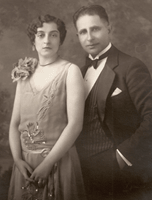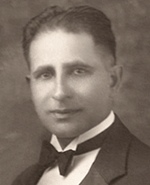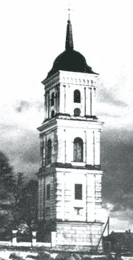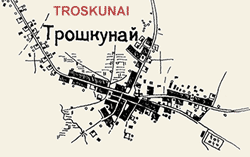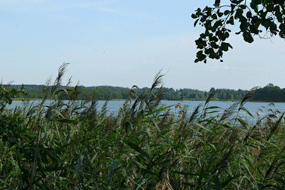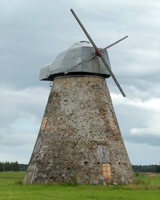A Visit to Troskunai in 1926
from the Diary of Esther Selman Solomon (1903-1989)
✷ See also Solomon family

Esther Selman Solomon
on her wedding day in 1926
(full view)
Esther Selman Solomon's diary allows us to see Troskunai in 1926 through the eyes of a young American woman from Boston. In that year Esther married Aaron Solomon, who had been born in Troskunai and emigrated to America at the age of 20. For their honeymoon, Aaron took his new wife to see the shtetl where he had grown up and which he had left behind 15 years earlier. This selection from Esther's diary, lightly edited, is presented courtesy of Laurie Carey, granddaughter of Esther and Aaron Solomon.
Kovno, June 30, 1926
Arrival in Kovno We arrived here at 11:30 a.m. today. Aaron’s brother Shapse met us at the station. Gee, how pleased and excited Aaron is. He’s been reviewing old instances and is actually prattling away like a kid.
Kovno [Lithuanian: Kaunas] hasn’t made any impression whatever upon me. It’s just what I expected it to be, only more so. There is no sewage system here at all. The people seem to be very poor indeed. Even the hotel where we're staying tonight is in a dilapidated condition. It’s supposed to be one of the best, if not the best in Kovno. The meal we had this noon at the hotel, frankly, I almost threw up everything I ever had eaten before. The street on which the hotel is, is the best street in the city or the main street. It looks like one of the back alleys in the States.
We came to the hotel in a flivver.[NOTE]flivver: Ford Model T An automobile here is seen very rarely. I saw a very amusing spectacle here in Kovno a short while ago: a horse driving a streetcar. That's the way passengers are transported. They have omnibuses also but very few, and you ought to see them!
Today is practically the first day that I've felt homesick. I'm awfully glad for Aaron that he's at last going to see his folks, but frankly, I'd love to see Dad and Mom and the kids now.
Shapse, Aaron’s brother, is a clever chap, but poor. He speaks of better days, but times are terribly hard for them here. The three of us went down to visit the American Consul with reference to the chances of bringing Shapse over to America. In a few years, perhaps, but they gave us no guarantee.
July 1, 1926
Driving from Kovno to Troskunai After a small breakfast in Kovno's most beautiful restaurant, in the park (open air place) we got our things ready for our trip to Troskunai [Yiddish: Trashkun]. Seems that it would take us almost ten hours to get there by train and ten times as much bother. We took a short way out of it. Aaron hired a Buick car and we travelled for four hours in state with a chauffeur and all. Aaron sat in the back seat with me, and for once didn't put on his imaginary brakes. I suppose it was because he was so busy gabbing away with his brother Shapse.
We saw many remains of the Great War along the road. The Germans left a railroad track, and you ought to see the cute miniature freight and passenger trains that go on it. We passed through a town called Vilkomir [Lithuanian: Ukmergė] (map). It was indeed very interesting to see a real market there: live cows, horses, hogs, pigs, etc. for sale.
One very common spectacle along the roads is the number of small hay-laden vehicles one sees, pulled by a horse or two. We missed two accidents—at least we avoided them. Horses here get scared when an automobile passes them, and so we almost had them on top of us. Another time, we drove right into a bunch of cows who were in the road. One of them, in her endeavor to get away in time, got a real bang in the shins by one of the auto's mudguards.
While driving, we saw piles of extremely brown earth piled up on one side of the road, with a small running stream of water alongside it. Upon inquiry, we learned that this brown earth was prepared in squares, made solid, and then was used for fuel. It contains a certain kind of flammable substance, it seems. Of course this struck us as being very unusual indeed.
Another time along the country road, I saw an enormous looking bird. It looked familiar and yet it didn't. To my surprise, I learnt it was a stork. Suddenly it took flight and the enormous expanse of its wings almost cast a shadow over the car. I afterwards saw a few flying, and they look almost exactly like pictures I've seen.
Entering Troskunai Nearing Troskunai, you couldn't keep Aaron down. Shapse insisted that Aaron should drive the car into the town, and so he did. [See author's note below, ADDED YEARS LATER] On the outskirts of the town of Troskunai we encountered two fellows who, upon seeing the car, hailed us exuberantly. Instantly the car stopped and Aaron jumped out. They turned out to be one of Aaron's nephews, a chap who goes to the university in Kovno, and a cousin. So after they had clambered in, we were off again. This time, we stopped for about ten minutes and had some wine and cake, and I was presented with two bouquets of wildflowers, which were beautiful. We received this reception from one of Aaron's uncles and a few of Aaron's nieces. Finally we turned in to the main square, and at one of the houses, we saw a mob waiting for us. Yes, the whole town had turned out to greet us.
After a while, I met the entire family and then washed up and ate something, and prepared myself to learn something of the Jewish language. Aaron was quite pleased to find that his mother is quite liberal and isn't as Orthodox as she used to be. He doesn't have to eat with his hat on, etc.
The War Changed Everything As for conditions here, well, what we expected, we got. Aaron, though, was very much disappointed with the town. In his days, it was a beautiful and prosperous little place, but the war changed everything. The people are all poor and are very dependent upon their folks in America. As I understand, all Lithuania is supported by contributions from their American relatives. It's so pitiful, the way the people in this town suffered. First they were under Russian rule, then in the Germans' hands at which they suffered cruelly. Then they were driven out of their homes entirely, into Russia. Then, becoming homesick for their native land, they came back to Lithuania.
Friday, July 2, 1926
There was the usual mob of people present, and Aaron seemed to be having the time of his life, recalling everybody's names. I still feel a bit strange among the people, for they look upon us as novelties and watch our every step, movement, or act.
[ADDED YEARS LATER]
April 26, 1981
I would like to add to Aaron's turn at the wheel of the car. Shapse offered to direct him into his home town but he refused, saying he'd recognize the church steeple as one of the landmarks. Well, he went right by it. Did Shapse laugh! Aaron was very embarrassed. You see, when he had left home, the steeple was one of the tallest, if not the tallest, in town. But when he came back after being in the U.S. with its tall buildings, this one here was a baby.
Flies on Food I'll never forget our first meal at Aaron's mother's home. The minute the food was put on the table, each plate of food became covered with myriads of flies. I couldn't eat a thing. Aaron told his folks why I couldn't eat, so the next day one of Aaron's sisters went to the store and bought many yards of cheesecloth. This was put over all the open windows instead of screens. Unfortunately, they couldn't cover the door, so the flies still came. Until I became accustomed to taking the under-layer of food, I lost many pounds.
Saturday, July 3, 1926
Going to Shul Aaron received the maftir[NOTE]maftir: the last person called up to read the Torah portion on Shabbat this morning in the synagogue. It's an honor to receive that, as I understand, and I went to the synagogue to see Aaron get it. Frankly, I thought the ceremony would be much more elaborate, so naturally I was disappointed. Aaron's mother and family were astounded when I suggested that I go also, and also pleased.
After the men came home from shul, they had a bracha [blessing] in Aaron's mother's home. After this, during which I had a splitting headache, we had dinner, and Aaron and I took a walk, alone for the first time. Up to then, we had half the town travelling after us.
In the evening, after supper, we took a walk to the station to see Harry, Mrs. Rebecca Gross's brother, off to his native village. Oh, what a long wait we had there, and gee, what a wonderful time the komarn (mosquitoes) had with me. On our way to the station, the whole bunch of us sang various songs, and then Aaron and I sang a bunch of jazz stuff.
A Bumpy Ride When the miniature train at last arrived, we bade Harry goodbye and started homeward. But as Shapse had brought the all-famous Solomon horse and wagon (and had lost a wheel on the way down), Aaron's aunt and Aaron's sister Etel went home with him. I refused to go because I was afraid. So the rest of us walked, and pretty soon, in the distance we heard the rumbling of a cart. And sure enough, it was Shapse. He and Aaron made up their minds that I'd have to ride home, so before I knew it, I was dumped into the cart on a bunch of pillows, and with Shapse on one side, Aaron on the other, and the horse in front, we started off with a bang. Needless to say, I sat on pins and needles during the drive back. Anyway, it was the most eventful day so far.
July 4, 1926
12:00 noon. It's raining now, for a change, but the sun is shining. They're putting up hangers in our room. The weeks here, I hope, will fly fast, because there is so little to do. Aaron just mentioned the fact that it was Declaration Day today, July 4, and if I had had a pair of wings at that time, I would have rushed to dear old Boston to celebrate it.
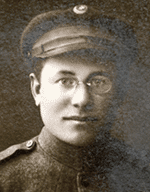
Shapse Solomon (full view)
War Stories In the evening we had a storytelling hour. Shapse and the bunch told many tales of their suffering at the hands of the Cossacks, the Germans, etc. The stories were very pathetic, but they were told in a humorous manner so that we had many a laugh here and there.
I am beginning to feel more at home here now, and our quarters are a bit more comfortable also. This coming Saturday, the whole town is coming to Aaron's mother's home to celebrate in honor of Aaron and myself. I'm dreading it but they're all looking forward to it. I played ball today with Aaron and the gang.
Weddings & Funerals I've already seen a wedding and two funerals here (two children died). I mean I only saw the processions. The wedding procession consisted of a few teams, of which the horses were bedecked with flowers, and the vehicles or wagons with hay. The occupants were dressed in their best regalia, with the usual headpiece, white kerchiefs. It is customary in the funeral processions here that four persons (I've only seen women) should carry the casket, surrounded by flowers. The priest marches in front and so onward toward the cemetery. Meanwhile, the church bells are continually ringing to denote the passing of a soul. At one of the funerals (at which there were a number of people) there was much doleful singing.
Beautiful Voices One outstanding feature about the people here is their beautiful voices. At dusk, while the women (Christian) are strolling home, they break into song. They even know how to harmonize, and it sounds wonderful. Their voices carry very far, for there are fields on either side of them. Most of Aaron's immediate family have very good voices, and it really is a pleasure to listen to them sing.
July 5, 1926
Nothing different occurred today, except that we had our daily stroll and some more visitors arrived. In the evening, while Aaron and the gang were having their every-minute talk, Saul and I took a stroll. Hereafter, I think Aaron shall get the prize for giving daily talks, each talk lasting five minutes with no intermissions. The prize will be a tongue. Of course it isn't his fault.
Tuesday, July 6, 1926
One of Aaron's cousins, a brother to Abe Solomon of Mt. Vernon, NY, went home with his daughter.
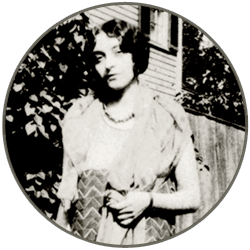
Esther Solomon (enlarge)
Hair Styles The young girls here are so old-looking and even show signs of having wrinkles in the very near future. And they all wear their hair the same way, cut on each side, with a pug in the back, which is made in any old way. I washed my hair today and it came out terrible because of the water, so of course it had to be washed again. This time it was better, but not so good.
In the early afternoon we played ball for a while. In the evening we visited Aaron's sister Fanny [Feyga Solomon], and the gang sang.
Wednesday, July 7, 1926
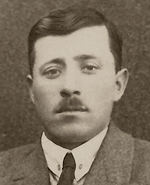
Abram Solomon (full view)
We've been married four weeks today and haven't regretted it yet, and won't. Most of today was spent eating and playing cards—sixty-six—and I'm going to play until I can beat Aaron!
Toward evening Aaron and I took a walk, and on our return were told that Aaron's brother Abe [Abram/Avram Solomon] was coming. Five minutes later he arrived with his wife. He's two years younger than Aaron and looks ten years older. Aaron is much better looking also. Among the men in his family, Aaron takes the cake.
Thursday, July 8, 1926
Market Day Today is market day, and there is some excitement in town. Shapse has been continually begging us to go, so after we took a few snapshots, we went to the "mark." I had pictured a mob. Instead there were five teams and about twenty people, but very picturesque, especially the little baby horses. I took a few snapshots there.
The folks here just received a telegram from Dr. Mones Solomon of Minsk, Russia.[NOTE]Minsk is now in Belarus. He's Aaron's older brother. The excitement is great here, for he's coming after all.
I'm becoming a card shark—beware—I beat Aaron at sixty-six.
Friday, July 9, 1926
Nothing of much import occurred today, except that they have taught me how to play 1000. It's going to rain, I think. They say when it rains here, it doesn't let up. Shapse has given me a bunch of old Russian and German money to take back to the States with me, as souvenirs. The only reason I'm doing so is to show them to Dad.
Names I don't think I mentioned the fact that I've been called Helen ever since my arrival here.[NOTE]Esther's mother-in-law Chava-Ester was superstitious about having two living family members with the same name, so Esther used her middle name Helen. "Esther" sounds strange to me now.
During the afternoon Shapse and I took a stroll, and toward evening, after dinner, Aaron and myself took a walk beyond the square and went as far as what I would call Breezy Corners, where stands an old, picturesque windmill, a real one. We must take pictures there. In the evening we all sat outside and sang English, Russian, and Jewish songs.
Saturday, July 10, 1926
The Local Doctor Today we are going to visit the richest folks in town. The woman came and invited us herself. Her husband is the "supposed" doctor in town, and gets his experience by practicing on his poor sick victims. I understand he never studied medicine—so the motto out here is "Keep well."
After mitog [lunch] we went into the woods to while away a few hours. We played ball, picked wild strawberries, and of course ate them. Before starting for home, we took pictures, and here we are back again. Aaron and Shapse stole in here a short while ago to steal a smoke.
Sunday, July 11, 1926
It was terribly hot, more so than usually. We whiled away our time, talking and eating. In the late afternoon we visited Aaron's uncle, and soon after that, we took a stroll and saw the wheat fields.

Shlomo Kovnovich
Gifted Musicians Around 9:00 p.m. the whole gang visited Shlomo [Kovnovich], Paul Kovner's uncle. It was surprising how well he played the violin, accompanied by his son who also played. They say that geniuses spring up from Lord knows where, and its true enough. Here, buried in a little obscure village in Lithuania, we should come across two people, men, whose hearts and souls dwell in their violins. Their entire knowledge of music was not gleaned from any print, but just from what their hearing apparatus had heard and kept for further use.
The son also paints a bit with colors. Imagine how well they could better themselves if they had a little help. They're just as poor as church mice, as one can very well notice by their home. If Paul Kovner knew about this, I’m sure he would help them, for it is from this sort of mold that genius arises.
When Shlomo began playing popular jigs, the crowd began to lift their feet. With a bit of coaxing, we started dancing. The first ambitious couple was Shapse and myself, but it was only an attempt because Shapse got cold feet. After that, Aaron and I danced a waltz and foxtrot. Not to be outdone, Saul and his sister Sarah danced a popular Lithuanian dance. So it all ended well.
Monday, July 12, 1926
Preparing Wheat for Sale It's as hot as hell. Shapse is cleaning wheat to make it ready for sale. I saw the odd contrivance they have to clean the wheat with. They also have another machine with which they weigh the weights as they call wheat. If a cupful weighs 125, that means it's good wheat and can get the guaranteed market value. If it's lower, it's of a lower grade and can't fetch as high a price.
Towards evening, two wagons filled with sacks containing the cleaned grain or wheat were started off for Panevezys [Yiddish: Ponevezh], and the two men in whose care the wheat was left only got $2.00—imagine that was for cleaning the wheat a whole day, loading it on the wagons and driving a whole night to the city.
Later on Aaron, Saul and I took a walk all around Troskunai. It was some walk. We tramped through fields galore, and I saw field upon field of flax, newly sown. Finally, after an hour and a half of continual walking, we reached the cottage. Everybody turned in early because we decided to go to Panevezys, Tuesday.
Tuesday, July 13, 1926
The Train to Panevezys [Yiddish: Ponevezh] Oh, what a terrible time I had getting up at 3:30 a.m. for we had to catch the 5:00 train. Leybe [Pevzner], Chana's husband, took us down to the station in the family limousine—a horse & wagon—and when we got to the station we had to wait. Finally at 5:05 the toy train pulled in and we boarded it. We took the last compartment near the platform. On the other side of our compartment was a stove. It seems that in the winter the passengers bake their own potatoes in it, and even their meals. Funny! At 5:30 the train pulled out. We expected some speed. It kept panting along as if it had a belly-ache and also a severe toothache—until for sympathy's sake, Aaron and I almost jumped off to give it a lift.
Shapse told us that one day last winter, on his way to Panevezys by train amid a severe snowstorm, the train refused to go, and so they—the three passengers—had to stay aboard the train for 24 hours. In the meantime the fire in the stove went out. At the passengers' request to the conductor that he should replenish the supply of wood, they were informed that that wasn't his kind of work; if they wanted some, they would have to get it themselves. So Shapse went out wading into the snow to get some twigs. While chopping some of them, he hurt himself. So they were cold for the rest of the trip.
At 7:30 a.m. we arrived in Panevezys and were driven to a hotel in a buggy—pretty snappy, what say! At the hotel we ate some breakfast. (There was only one table there, and the help was as slow as cold molasses.) Etel and I slept for a while, and Shapse and Aaron went off by themselves.
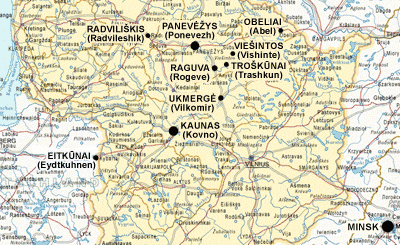
Places mentioned in Esther Solomon's diary (enlarge)
Panevezys Panevezys is a much pleasanter looking city than Kovno. It is cleaner. We had a good mitog there. It seems that the entire city must have heard that some Americans were in town, for the hotel became flooded with different people who wished to see Aaron. One in particular wanted Aaron to look up a brother of hers who lives near Boston, and it turned out that he lives in California. They must think that the U.S. is two miles square.
At 5:30 Etel, Aaron and myself set out in a flivver, 1926 model, to visit an aunt in Raguva [Yiddish: Rogeve]. Oh, what a shaking up we got. The road was so bad that when we arrived and I got out, I was still under the delusion that I was being thrown about in the flivver. We arrived there after seven, had something to eat, spoke—about the flies in particular for they gave us a grand welcome.
Wednesday, July 14, 1926
We spent the whole day in the garden for it was damn hot. Chana's husband arrived in the team and we decided then and there, much to my pleasure, that we would start for home at 6:00 p.m.
Flour Mill In the late afternoon, we visited Aaron's aunt's mill, where they grind the grain into flour. This mill formerly had the picturesque four wings and was operated only when the wind blew. But after her husband had returned from Africa the second time, they abolished the wings and now they have a steam apparatus. One would think that these folks are very well-to-do. They would be if they had grain to grind. The trouble is, they haven't.
Around seven o'clock we started in our limousine à la carte. I can frankly and safely say that I enjoyed the ride home in this apparatus 100% more than in the flivver, even though it took us almost three hours to cover 18 versts—about 12 miles. The scenery was beautiful. It was much cooler, and as we had some lunch with us, we partook of it while the horse jogged along at the rapid pace of a half-mile an hour.
You'd think we'd been gone for a year, judging by the welcome we got. Did I sleep like a log? No, only better, which shows that one can live anywhere, for all he needs is to get used to the place. I wasn't content with Troskunai until I saw Raguva (though the latter is a bigger town).
Thursday, July 15, 1926
This morning Aaron and I were considering going to Poland. Aaron will inquire as to what's what and if it will be too much out of our way. We'll take the trip, I hope, for it would give Dad great pleasure to know that we had seen his mother.
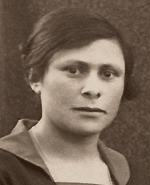
Chana Solomon Pevzner
(full view)
Aaron has just gone to do some visiting alone. His sister Chana just brought in a small bouquet of flowers that a Christian neighbor of theirs brought for us. They smell lovely.
Friday, July 16, 1926
Today started with a bang, for I received three letters from home: one from Dad, one from Ida, and the other from Betty and George. I'm going to frame them, or at least I ought to, for Dad wrote poetry and George waded deep into comedy.
It is much cooler today and twice as much welcome. Everybody here seems to be praying for rain, for the crops need it badly.
Saturday, July 17, 1926
Observing the Sabbath There was a little excitement in town today. Some of the young folk of the town stole off into the woods to play football, but not unknown to the most Orthodox man of Troskunai. So, standing amid a crowd of people, this man lectured them on keeping the Sabbath, much to the amusement of Aaron and his family.
Another thing that struck me as being very silly indeed was this: chess can be played on the Sabbath but cards are forbidden. It is even forbidden to file your nails, or tear paper. On our behalf the Christian maid in the house is continually on hand to light the fire, etc. You are not even allowed to carry things, but if you go through a certain alleyway, you may. Ridiculous, I say.
Everybody is being weighed now. A committee of two, Shapse and Saul, have just informed me that I'm next. Aaron and I are continually arguing about eats. He wants me to eat more, and I still insist that he should eat less. Honestly, he's getting so stout that he almost waddles when he walks. I suppose I shouldn't talk until after I've been weighed.
Golly, gee whiz, I'm longing for some amusement. It's hell to stay—or rather live—here for any length of time. Sometimes I mind it more than others. It's especially on a Saturday, when you can't play cards, etc. I'm almost ready to go to bed now and sleep until the time to catch the train for Paris.
This afternoon we went into the woods and sat down in the clearing with the gang. After a while, Aaron, Leybe, Chana and myself went into the woods to pick raspberries, but we only could find a few. An hour and a half afterwards we walked home and had supper. During and after supper, we all talked about the good old USA and tried to convince a second cousin of Aaron's that the USA was the best place after all. We had some laughs at Shapse and Saul, who began to relate all kinds of stories about the only motion picture place in town, and of the plays that they themselves had given.
Sunday, July 18, 1926
Fun and Games We had a berry-picking duel this afternoon as to who could pick the most and who could eat the most. Aaron won the eating contest and I, the picking one. Toward evening we went for a stroll and incidentally were spectators at a football match (amateur). All they did was kick the ball around, and some didn't even know that much. While watching the game, we were entertained by two Christian boys, one of whom played a song or two on his accordion for us, and played it well, too. One of the little boys of the neighborhood came riding by on a horse, and as luck would have it, just as he was going to show us how well he could ride, the horse (who was a starved one) refused to go any further. We ended by dropping in to visit Morty and his wife. At their home I showed them this, much to their amusement:
![]()
Morty's wife is cockeyed or cross-eyed, and how a good-looking man like Morty ever married her is more than I can see.
One day last week, while talking about funny names, I happened to mention Mrs. Karlsberg's four kids' names: Hymnskim (?) [Chaimke?], Fifky [Fayvke], Tefky [Tevke], and Lichky [Leytshke?]. So that night I had to repeat it again, for they like to hear me say them with that immutable American Jewish accent, I suppose.
Monday, July 19, 1926
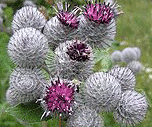
burdock burrs (more)
Have just written a card to the folks. Aaron is being taught a Lithuanian gambling game and is trimming them at it. The heat was excruciating today, and I had one grand time with the peachiest of a headache.
Tisha B'Av At dusk, Aaron went to the synagogue. Everybody sat on the floor and at certain times threw stickers [burrs] at one another. The entire ceremony was held because of the fall of the Temple. It also denoted the end of the nine days.[NOTE]Tisha B’Av, the Ninth of Av, is a day of mourning for the destruction of the Temple. It is a fast day and people avoid every kind of comfort or pleasure. There was a custom of throwing prickly burrs at one another to provoke discomfort.
Tuesday, July 20, 1926
Aaron went to the cemetery this morning with others to locate the grave of Jack Solomon's father, but went in vain.
Muddying the Water After he came back, we went to see how some men were catching freshwater fish with a big net. First some kids threw stones or etc. into the water to stir the fish, and then the two men, each holding onto a large net on either side, waded across the small pool of water, and when they got to the opposite side, opened up the net. While engrossed in this, we were unaware of a newcomer who made known her presence by cursing the two men in Lithuanian. Soon she was joined by another woman. It sounded like a real cat's concert, but the men paid no attention to them whatsoever. The women's complaint was that they made the water muddy so that they wouldn't be able to wash their clothes clean.
Wednesday, July 21, 1926
We've been married five weeks today and not sorry yet. Funny, isn't it?
Aaron's uncle Eli [Eliash Solomon] is coming from Obeliai (map) early Friday morning, and his coming is being keenly awaited because he is loved the best of all. It rained at last today but not much; anyway there's promise of more.
Thursday, July 22, 1926
A Lamb Is Slaughtered After breakfast today we went to the "mark" in a pelting rain, and from there to Aaron's sister Fanny. We saw a lamb being slaughtered and how it is tested as to whether it is kosher or not. The lungs are taken out, and if a certain tissue doesn't stick as it's supposed to, the lamb is treyf. In other words, the lamb was a sick one and the meat would be unhealthy for human consumption.
On our way home, Aaron encountered an old Christian man at whose home he often used to hang out. We were invited to visit him Saturday.
I coaxed Shapse, Saul and the others to present one of their plays for us, so it was decided that there will be a performance on Saturday July 31.
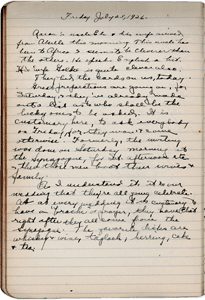
Page from Esther's diary (enlarge)
Friday, July 23, 1926
Aaron's uncle Eli and his wife arrived from Obeliai this morning. This uncle has been to Africa and seems to be cleverer than the others. He speaks English a bit. His wife Golda is quite clever also. They had the cards on us today.
Great preparations are going on for Saturday, and they've already made out a list as to who shall be the lucky ones to be asked. It is customary here to ask everybody on Friday, for they won't come otherwise. Formerly, the inviting was done on Saturday morning at the synagogue for Saturday afternoon, etc. Then those men brought their wives and family.
As I understand it, it is our wedding that they're all going to celebrate. As at every wedding, it is customary to have a bracha or prayer. They have that right after they all come from the synagogue. The favorite dishes are whiskey and wine, teiglach, herring, cake, and tea.
Saturday, July 24, 1926
The guests are already here, and I have been told to hurry up, as they are all anxious to give me the once-over. Instead, I took my time and just as all the old men were leaving, made my opportune appearance to bid them a Jewish addio. I was quite surprised to notice that only the men had come, and at my puzzled inquiry as to the reason, I was told that the women came in the afternoon. Gee, what a grand occasion it was. Everybody was dressed to kill, so they thought. I wore my little green and tan dress instead of the yellow.
After mitog (when the guests went home), we all sauntered into Yosef's little garden (next door). There some of Troskunai’s young folk were seated eating some of the berries. The young chaps take their girls here, and all seat themselves on one of the rustic benches. Then Yosef, knowing what they want, picks some berries for them and places them on a large plate for the people, at the price of 3 cents for one large platter full.
Then it began to rain, so Aaron and I made for our room and got there just in time. We’re staying in Yosef’s house. We stayed in our room for a while, telling each other childhood reminiscences, and both enjoyed it.
Wedding Party Finally we were called by Chana and were told that our presence was required, for the women had arrived. So we went and Aaron gabbed some more, and I shook hands and dumbly shook my head for want of anything to say, and smiled when they wished me all kinds of luck etc. And thus the afternoon dragged and finally dusk. Aaron and I stole away for almost an hour and took a rapid walk around the town. You can imagine how big the town is, if one can cover the entire ground in almost 15 minutes.
When we came back, we saw that the musicians had arrived—Shlomo and his son—and we heard the shrill tones of their fiddles. When we made our appearance, there was a commotion. Hisses could be heard for everybody to shut up and shushes. It was funny. Evidently they had planned something. Two of Aaron’s nieces were stationed at the door to keep us out. Finally at the given word we were let into the house, to the strains of some sort of a march that is always played out here when a bride and groom appear. Then, amid laughter, the “musicians” stopped and everybody partook of whiskey, cake, teiglach, etc.
Dancing The tables were cleared and moved away, and then the dancing commenced, but try and dance. The whole town had turned out, and those that weren't invited peeked in through the windows and flooded the doorway. All the guests were in the main room and left little room indeed for dancing. Anyway, we had lots of folk dances first. Aaron and I were the onlookers, of course, and we sure did enjoy them. They're so different, very short and stilted steps, most of them. The most interesting dances were those danced by Aaron's sisters' kids, one which Mrs. Golda Solomon (Mrs. Gross's mother) [Eli Solomon's wife] danced (a polka) when the two kids danced a "kozatsky," and the quadrille. Saul danced just like a real Russian, mostly on his heels.
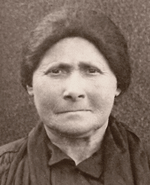
Chava-Ester Solomon,
Aaron's mother
(full view)
I forgot to say that they made Aaron and me dance. So we did, but as the music was Russian and the dancers were American, the dancing was a combination of both. Aaron was hailed as a wonderful dancer. I wish he were. They were quite curious to see the Charleston done. I would have accommodated them with the proper music, but as it was, I didn't.
After the dancing there was a concert. It was quite interesting to notice how Aaron's mother was taking everything in with such a look of pleasure on her face. She's a very cute little old woman, and quite liberal with her morals etc. Then everybody sang, and finally at 1:00 I turned in. The guests left soon after.
Sunday, July 25, 1926
A priest has died. His home was in a neighboring town, but he's going to be brought to Troskunai to be buried tomorrow. While waiting for Chana to bring me hot water with which to wash my hair, I can hear the lamentations from the church. Every one of the Christians are singing different hymns etc. in honor of the dead priest.
A Legal Matter We visited Aaron's oldest sister, Fanny, and there we talked over a legal matter. It seems that the land next to Aaron's mother's house is owned by one of the tightest Jews in town. He's going to sell to a Christian. Several years ago, some quarrel as to three feet of land between this Jew and Aaron's father was settled to the satisfaction of both parties, and the legal document then made in favor of the Solomons was left with the rabbi, as is the custom here. Now, unless they get that document, they will have to tear down a stone wall which was built on the side of their house on the land at issue. If they are unsuccessful in obtaining the document, the Jewish man can show an old plan and deed where the Solomon wall is on his land, and can ask any amount of money for the wall.
In these countries here, the rabbi takes care of Jewish legal affairs. When property is sold, a notary or advocate takes care of it, makes the deed, and keeps it together with a notation in his books of the deed. No registration is required, so that if the rabbi's notary's or advocate's house burns down, loads of people are out of luck with reference to showing a legal ownership in hand, except of course by parol evidence, I suppose, to that effect.
I wore my yellow dress today and it was admired every minute of the day, together with my purple bracelet.
In the evening, Mr. and Mrs. Eli Solomon went back to Obeliai. Mrs. Solomon cried and asked us to "gruss" [greet] her daughter Rivka (Mrs. Gross).
Monday, July 26, 1926
A Priest's Funeral It is 9:30 a.m. now. The death procession for the priest has begun. First came five men, dressed in white silk smocks with lace or black trimming. One of the men is a son of the deceased. After that comes the coffin, containing the body, carried by men, and the procession that follows the coffin is the largest I've seen out here. A daughter of the deceased is there also, dressed entirely in black. It is a very mournful procession, and even the Jewish folk are impressed a bit, so much so that lots are following the rest.
A Trip to Viešintos [Yiddish: Vishinte] (map) At 10:00 a.m. we board the wagon and are bound for Viesintos —Leybe, Chana, Moshe Fayvke, Aaron and myself. Moshe is on the front seat with his parents and has hold of the reins. Along the way, we (Leybe and Aaron) stole some young green peas from the fields and ate them. They are very sweet.
It took us 2½ hours to cover 14 versts (about 10 American miles). Finally we arrived and met Alter just as he was going to telephone us. He and his wife and daughter were very pleased and honored to receive us. Alter has a small dry goods and hardware store, but makes very little from it. He is one of the leading men in town and is also one of the selectmen.
After partaking of some delicious pastry, candies, port-wine (which tasted like champagne and which I drank like water) and fish, we were led to what is the pride of Viesintos, their lake. They have need to be proud of it. The scenery was wonderful. Picture a large pond with three or four necks of land, covered with forests of pine trees, protruding into the water. On the middle neck, some cattle were grazing. It certainly did look picturesque. One side of the pond is used for bathing and another side for fishing.
We saw the contrivances with which the fish are caught. They are small wicker round baskets like, with round openings on either end. In the center of the basket is a bait—some fish (dead). When the fish get in, they can't get out because at each end there are spiky-looking twigs. Then we proceeded to the fish house, where they're sent away to the towns and cities. It was very interesting to see how a wagon was loaded with them, amid ice, and every now and then a pike or some other fish would throw itself into the air, in an effort to get out.
Being thirsty, we proceeded to the well, which Alter had continually been raving over. At the foot of a hill we found it, just a small pool of water which looked like the beginning of a brook. With a glass we took the water and investigated it. It was the color of crystal and tested better than any I've had out here. We thrust our hands through the water, into the sand, and withdrew them quickly, for there seemed to be a quicksand under there. It is the perpetual cooking and rising of the sand and lime there that keeps that pool sterilized. People come to this pool, or natural well, from all over the neighborhood. The stream, brook, or well, empties into the Viesintos Lake.
Water Mill & Windmill Further along, following the stream, we came across an honest-to-goodness water mill and saw how they work it. There is a large pool of water in the back of the mill, with an opening on one side which is dammed up. All they have to do is to open this door to let the water from the pool go through a passage (of wood) to a large wooden wheel (similar to that of the red mill at Nantasket Paragon Park). When the water rushes out, the wheel turns, and simultaneously all the machinery in the house adjoining the wheel begins to work.
About a mile away from this one, we saw a windmill. How majestically the huge wings turned against the horizon, so lazily, as if they were letting the rest of the world go by, and just let anybody prevent them from spinning around as slowly and dignified as they turned.
What was very outstanding about this neighborhood was the irregular land. Most of the land that I've seen here has been lowland. That's why we enjoyed ourselves here. We sat on a small hill which was covered with pine trees and looked our fill of the lake, with the small necks of land, with cattle feeding on them. And we even saw a stork flying along. There were two hills, and they looked as if one had thrown them down in their present location, such pretty, restful little hills.
When we finally came back with our systems full of the salubrious air and wonderful water, we were fed with a very good mitog and then at 7:45 p.m. homeward bound were we to Troskunai.
Wednesday, July 27, 1926
Reading Sholem Aleichem We had a reading siesta today. Shapse read a few stories to us from Sholem Aleichem, the eminent Jewish writer of Jewish life. I enjoyed it very much, for not only were the stories cleverly written but the reading was very well done, with a dramatic finish here and there. Shapse would make a good actor.
Later on we played ball, and I got a good bang in the eye from Aaron, who must have thought I was in Viesintos, judging from the strength he put into that throw. Anyway, I lived through it. We were just going to take pictures when the sun suddenly disappeared, although Aaron managed to take one of his mother, who was unaware of the fact at the time.
Abe (Aaron's brother two years younger) and his wife left tonight for their home. So we walked to the station with them. The poor fellow hated to go home, for he lives in the wilderness out there with hardly a soul to talk to. Before he left, he presented me with a bundle of candy, as if I were a kid, and asked me to get after Aaron so that he would write to him, for a letter there is a novelty. He told me all this with tears in his eyes.
The train, as per usual, arrived a half hour late. Thinking he had plenty of time, Abe stayed in the train awhile to make his wife comfortable and then kissed Aaron and myself goodbye. Suddenly the train began to move. I yelled the fact to Aaron and Abe, and they said it wasn't because the men hadn't yelled out, "All aboard." No sooner said when it was shouted out. Oh, what a mad rush. Abe and Aaron began to run rapidly along the platform and just at the end of it, as the train was leaving the station, Abe got on without having bid the rest of his folks goodbye.
I forgot to mention that during the afternoon an old woman came to the house and asked Aaron to write two English letters for her to America. So I wrote it, and Aaron interpreted. When completed, I asked her to sign her name to one of the letters, in Yiddish. She took hold of the fountain pen, which kind she had evidently never seen before, and put the point in her mouth to wet it, as is done with ordinary lead pencils. We had all we could do to control our laughter. It was too funny for words.
Wednesday, July 28, 1927
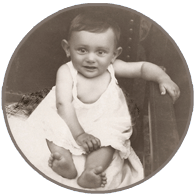
Moshe Fayvel Pevzner
(enlarge)
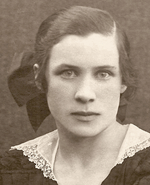
Etel Solomon
(enlarge)
We are going to take pictures now, I think, after mitog. Just as we took one picture of Etel, the sun hid its face, so we'll have to leave the windmill for another day. But we took in a stroll anyway.
Fanny, Aaron's oldest sister, gave us a tablecloth, and Chana is going to Panevezys tomorrow to buy us something, methinks. I gave her my weekend cake to take along with her.
Moshe Fayvel [Chana's son] is becoming very friendly towards us. He came into our room yesterday and presented us with candy and left us, under protest. He's a very cute kid and possesses a brilliant little personality.
4:00 p.m., Thursday, July 29, 1926
Today is market day again, but there seem to be more people and vehicles here than I've seen. Everybody is getting ready for the great event on Monday, when there will be held an annual holiday. We walked around the square a few times and then strolled home again, but we were overtaken by the rain, so ran most of the way, amid laughter, and finally reached the house, drenched.
Aaron has gone to the cemetery with Shapse, Leybe, his mother, and the man Abe Eli who says he knows where Jack Solomon's father's grave is located. Chana has gone to Panevezys.
We received a letter from Aaron's brother Abe this morning, and I received one from Rhoda and Ella, also.
Aaron has decided to go to Panevezys tomorrow, alone, to see Dina and Etel, two cousins of his. I shall remain here. He decided that it would be best thus, for then we both won't have to spend all day Monday in Panevezys and can start off on Monday morning at 5:00 a.m. for Panevezys, arrive there at 7:30, and take the 11:00 train to Kovno and so en route.
The Blacksmith We visited a blacksmith's shop today and saw how the fire is kept up and how the blacksmith works. (A small kid was continually turning a large wheel of wood, similar to that which comprises a wagon wheel. This wheel turns something underneath the oven, which blows the flames continually.) The blacksmith bore a resemblance to a young good-looking young man whom we had seen at the market, and there is a story connected with both of them. The father of the one whom I shall call A, whom we saw on the "mark," was the illegitimate child of Montvil (the one who formerly owned all of Troskunai), and the blacksmith is the illegitimate child of A's father and is A's brother. A's father was an active revolutionary leader during and before the war and served his time in prison for being so. Illegitimacy here doesn't have the sordid aspect that it received in the States, for the reason that it is not public, as a rule.
Shapse pointed out certain rents [holes] in the Troskunai church's sides, which were made by bombs during the war.
Christians and Jews Near the church on the corner of the street where Aaron's people live is a fenced-off parcel of land with a few wooden crosses in it. On that spot formerly stood a Jewish man's home. During the war, it was burned down. When the Jewish man returned the next morning, he found his land covered with these wooden crosses. He was told to get out, and so was driven away, without receiving any compensation, because the Christians couldn't bear the thought of having a Jewish habitation so near to their beloved church.
One can easily tell who rules this country, for everywhere stand wooden crosses, at the crossings and at each Christian dwelling house. The crosses are interesting in themselves. Sometimes one, by glancing at the top of the cross, can see some wooden figures of saints standing at the extreme point. Other times they have crosses containing miniature dwelling houses, in which stand colored small marionettes. This reminds me of the time we drove to Raguva from Panevezys in the Ford. We passed through a small village and there saw a small church covered with holy crevices [niches] in which stood saints, painted in every color imaginable. Even the holy lamb was presented. In Viesintos, on top of the doorway of a Christian cemetery was a small, hollow space in which were colored figures in mournful attitudes, which were supposed to represent the souls of the deceased people.
The Christian priests out here are all very well-to-do and are held in awe. They are called golachim by the Jewish people. In Viesintos the priest owns almost half the town.
Friday, July 30, 1926
It pelted cats and dogs all day. Chana brought a paisley shawl, two silver goblets, and other small gifts with her from Panevezys Thursday night. Most of the day we spent in playing chess and cards, and in the evening everybody brought their little packages containing different typical Jewish sweets, so we did some heavy thinking as to where we should or could place them.
Saturday, July 31, 1926
Oh, what weather. It's worse today. The mud is coming into its own, for it's almost knee deep. With what inner groans and facial contortions we suddenly realize that we have a duty to perform in the rear of the grounds here, for everything is wet through and through.
I was taught how to play chess a bit and like the game very much. Toward evening, I taught Chana and Etel how to make fried chicken in eggs with onions, and it sure tasted "falocious." We played sixty-six and another card game I was taught out here.
It is pitch dark outside and a suitable night for evil spirits. Whew, the wind is continually blowing strong. All we've seen since Thursday night is the four walls, for we haven't dared to saunter out. My one wish is that we have clear weather tomorrow so that we'll feel better and I'll be able to take some pictures of the mill, the haystacks, and the cattle and sheep.
Sunday, August 1, 1926
We've just finished most of our packing, and Aaron is getting ready to visit the different relatives and get rid of some money also. The weather is clear for a change, but the sun insists on playing tricks by hiding its face now and then.
Today is a Lithuanian holiday. The flag of the nation is seen everywhere, and people from all over are rapidly arriving. The Lithuanian constitution was adopted today.[NOTE]The constitution of the newly independent Lithuanian state in the interwar period was adopted in 1922—not to be confused with Lithuania's current constitution. Saul called me to see the procession (composed mostly of Christians with white kerchiefs on their heads) which was going to meet the one coming from Viesintos and Raguva. Gee, what fervent worshipers. As I understand it, today is a religious holiday and tomorrow is the legal holiday.
Goodbyes All day long people have been coming and going to the house with addresses for Aaron to look up and saying goodbye to us. It's the same thing over and over again. Shapse is counting the hours and Fanny is crying. Aaron's mother is holding out fine. She certainly is a sweet little old woman. Frankly, I had dreaded seeing her because I thought she'd be like most of the old women of Russia today.
Aaron and I went into Yosef's garden for the last time and picked the berries and sweet green peas. Then Aaron gave Yosef $2.00, and Yosef almost kissed his hand with joy. Later Yosef also came into the house and presented me with a bouquet of flowers, one of which (the only one of its kind in the bouquet) I have pressed. The crowd gradually grew bigger, to a mob. Regards were repeated to us time and time again.
As nine o'clock was fast approaching, the teams were made ready and our baggage was placed in them. As we still had loads of time until 10:30, we walked, accompanied by the entire town, it seemed. Aaron's mother and Leybe, Chana's husband, accompanied us to the crossing (Etel, Shapse, Saul and Chana were with us), and there the parting took place.
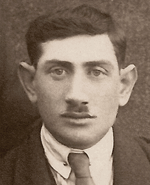
Leybe Pevzner (full view)
It was really admirable to watch Aaron's mother. She had herself controlled to the last minute, and it was only when she kissed Aaron, as if she would never let go, that she broke down and wept, and then she cried like a baby, as also did Aaron. Leybe, poor fellow, also broke down. He's a peach. And Moshe Fayvke slept through it all.
So we too, with the whole town, proceeded to the station. There, we saw another mob. After a wait of over an hour, while Aaron and I were being gobbled up alive with everybody's eyes, the train pulled in. After kissing everybody goodbye (and believe me, I needed lots of help), the miniature choo-choo train pulled out at 11:00 p.m. for Panevezys.
Aaron had bought six second-class tickets,[NOTE]Chana, Etel, Shapse, and Saul accompanied Esther and Aaron to Panevezys. which were supposed to be the best there was. I expected something grand. Instead I saw a car which looked similar to that of a Boston police patrol wagon, lit by two very small candles. Three men were lying on the benches, stretched out and snoring like hell. Well, we made the best of it and also stretched ourselves out (except Saul, Shapse and Aaron) until we arrived at Panevezys at 1:00 a.m.
At the station we hired our taxis (two hacks, so to speak), and the one which we were in almost lost its wheels. I had my heart in my mouth during the ride to the hotel. What a rickety old hack that was. Anyway, we at last arrived at the best hotel in Panevezys, where we had been formerly. Gee, what a dump. At 1:30 a.m. we drank tea and played sixty-six. The score was 1-1. As dawn was breaking after 2:00 a.m. we went to bed. I opened one of the glass doors to let in some air, and with a sincere hope that I wouldn't be visited by little strangers, otherwise known as —, I fell asleep to the tune of 1-2-3-4. The next morning at 8:30, I awoke to find Aaron dressed and observing me with a whimsical look in his eyes. I managed to open my eyes, and upon looking at the glass door window I thought I had opened, I found that there were two pairs of them. Gee, did Aaron laugh, for here I had fallen asleep with no air in the room whatsoever, when my perpetual cry hitherto had been for him to open a window or so.
Monday, August 2, 1926
Today we had breakfast. Yes, Sir! The best the world has yet produced and has yet to see. The coffee must have been used as rinsing water for the dish rags and tasted like h—. Otherwise, everything was O.K. Gee, but we sure did have one grand laugh at the table. The maid who waited on us was cock-eyed etc., so we began to kid Shapse along concerning her.
After frishtik [breakfast] we went shopping. We bought a beautiful paisley shawl (after returning the red one), two handmade table runners, and some Russian openwork stuff. Then Chana got something for the folks at home.
So Mitog arrived, and so did Chava (Alter's wife) and Bernard from Raguva. Chava had sent some new candies to Troskunai for us, but the bringer didn't arrive in time. I got a little drunk at mitog after drinking some Benedictine, and everybody had the grand laugh on us.
Shapse is a bit excited. He has just found out that many people are going to America, and he thinks he may go also.
At 7:30 we tore ourselves away from a mob and accompanied by Chana, Etel, Shapse and Saul, we left for the station, where we packed in the articles we had purchased in the city. The train for Radviliškis [Yiddish: Radvileshik] was waiting, so after a while, around 8:40, we said goodbye to Etel, Chana (who both cried), Berel (from Raguva), and David (Etel's husband).
So away we were for Radviliskis with Saul and Shapse. In three hours we arrived at Radviliskis, where we were met by Avram, who had come 32 versts from his home and walked 10 versts to the station. He certainly did surprise us, and Aaron was tickled pink. Then began a 3½ hour wait for the Eydtkuhnen train.[NOTE]Eydtkuhnen (Lithuanian: Eitkūnai) was in East Prussia, just over the western Lithuanian border. Today it is in Kaliningrad and is called Chernyshevskoye. (map)
Oh, what a wait that was in the waiting room there. The room was spacious but the comfort was junk. Anyway, we had tea and a small bite at around 12:30 and again at 2:00 a.m. It seemed like a nightmare to us, and Aaron and I were bleary-eyed from lack of sleep because we hadn't been able to sleep much at the Panevezys hotel, for the reason that they made a hundred or more rackets every five seconds or so.
Finally 2:00 a.m. arrived and the ticket office opened. The people here are so ignorant and illiterate that they don't know what's what. To purchase a ticket to Eydtkuhnen it took the fellow almost a half hour, and then he gave us too many and over-charged us. On the train, the men had the laugh on him.
So, at exactly 2:30, our last connecting link was broken with Lithuania, for we bade farewell to Shapse, Avram and Saul, and the train began to journey to the frontier city in Germany.
— End of Esther's and Aaron's Stay in Lithuania —


